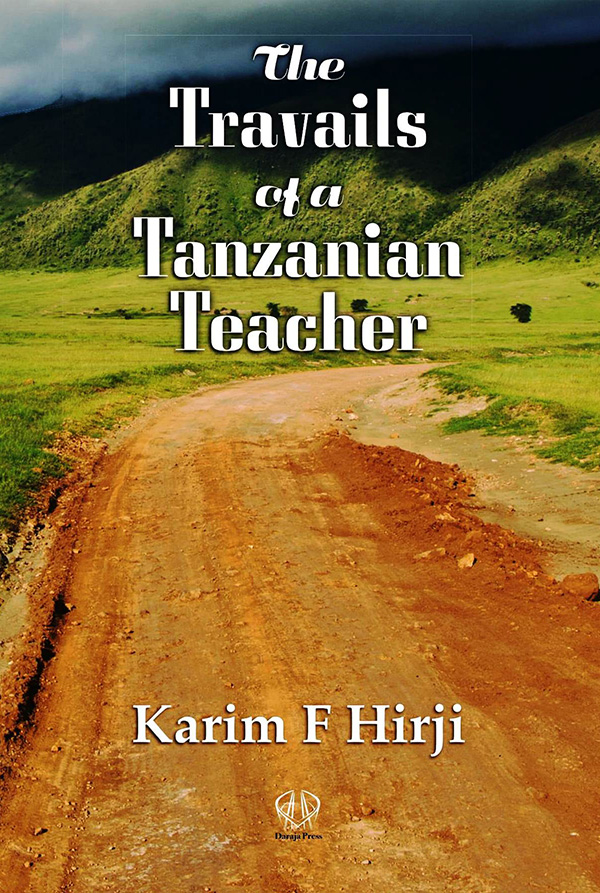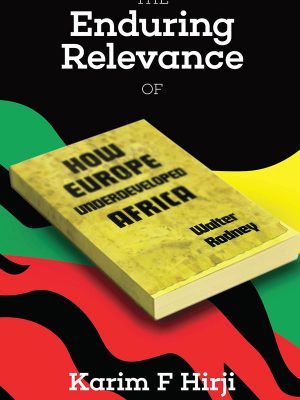Travails of a Tanzanian Teacher
Karim Hirji’s account of four decades of teaching in post-colonial Tanzania is a timely call on teachers to ‘educate in ways that will promote equality and social justice. Dr Anne Harley – Paulo Freier Project, University of KwaZulu Natal, South Africa.
Karim F Hirji (Daraja Press 2018)
Review
Ambreena Manji
Karim Hirji has had a long, varied and distinguished academic career. Spanning four decades from 1971-2012, he taught mathematics and statistics in several disparate places: first in a University mathematics department, then in an educational institute focusing on transport and finally in University public health and medical departments. In the midst of this, in 1980, Hirji went to study at Harvard University. He obtained a doctorate in medical statistics. He subsequently worked at Universities in both the USA and Norway. His published scholarship is similarly diverse and profuse and has been published in statistical and medical journals and in books.
Hirji’s memoir focuses on the first decade of his career. Known as both a social activist and a committed teacher, Hirji has never shied away from expressing his views. In this memoir, he sets out to tell it as he sees it. His assessments are blunt. ideological disagreements on open display.
In my view, the current book is best read alongside Hirji’s other works of memoir. His Growing Up with Tanzania: Memory, Math and Musings is a reflection on his childhood and school days. In the collection, Cheche: Reminiscences of a Radical Magazine a valuable account is provided of his generation’s student activism and political engagement at the University of Dar es Salaam. As Travails of a Tanzanian Teacher reminds us, the aim of Cheche was to provide an outlet for well-known campus activists to express their views on the most important social, economic and political issues of the day: ‘It took the ruling party to task for its half-hearted implementation of socialism. It did not come as a complete surprise that…later it was banned by the government of Tanzania.
The best parts of the current memoir are those that connect with the Cheche era of student activism and so provide further insight into the tumult and excitement of intellectual life at The Hill in that period. A good example is Hirji’s account of the student leadership in 1970 and the open challenge it posed to the academic hierarchy led by the Vice Chancellor. In chapter five (‘A pro-democracy uprising’) Hirji describes how before 1970 an antagonistic relationship had existed between the main student union and left-wing groups, not least because of the banning of Cheche. That changed in the academic year 1970/71 when leftist students succeeded in winning the leadership of the Dar es Salaam University Students Organization. Hirji’s account provides insights into students and workers’ grievances, including the shortage of staff in many departments and the payment of transport allowances. It shows how the students harnessed wider political discourse in addressing the academic leadership of the University. In an open letter to the Vice Chancellor, they invoked TANU Guidelines issued in March 1971 and known as Mwongozo in order to argue that just as the leadership style of the nation was expected to be that built equality between leaders and those they led, and must not be contemptuous and oppressive, so the leadership of the University must abide by the same principles. The students’ reliance on this radical document, which Hirji describes as the third key policy document on the implementation of the policy of Ujamaa in Tanzania after the Arusha Declaration and Nyerere’s Education for Self-Reliance (both 1967), met with the ire of the University. It resulted in the arrest and deportation of Akivaga to Kenya although he did return to campus to appeal unsuccessfully against his expulsion.
Academics responded with their own critiques of the University’s actions. The historian John Saul described the crisis as showing up ‘the stark contrast between the rhetoric of grassroots empowerment enunciated in a ruling party policy document and the harsh suppression of the people who attempted to puts its message into practice.’ The Law Faculty for its part published a critical assessment of the action against students. Law student Andrew Chenge and Law Lecturer Andrew Lyall questioned the legality of the administration’s actions and came to the conclusion that the basic tenets of natural justice and law had been breached.
This period of student activism had long-standing effects on campus. Hirji notes that progressive academics were galvanised. Ideological classes and public lectures continued the campus. The radical student journal Maji Maji was published and distributed. Beyond campus, progressive students worked in Ujamaa villages and went into schools to distribute socialist material.
This chapter’s account of the rustication of the students is a valuable and detailed historical source for those of us interested in the history and politics of campuses. It does not conceal the different ideological assessments that later emerged of the crisis. In an informative if rather inelegant section of chapter five, Hirji provides a retort to various commentator’s assessments of the Akivaga episode. Hirji disagrees with colleagues such as Haroub Othman, John Saul and Issa Shivji in the accounts they have given of the events and their implications. For example, one of the key issues on which he disagrees with Issa Shivji is that of the relationship between workers and students. In Shivji’s view, the students had failed fully ‘to mobilize fully the staff and workers who labored under the same debilitating bureaucracy.’ The students, Shivji claimed, had ‘paid scant attention to the grievances of their natural allies.’ Hirji describes this account as ‘factually flawed and highly misleading’. On the contrary, he writes:
The Akivaga Crisis was the only event in the history of UDSM in which solid bonds of cooperation between students, staff and campus workers were formed. Student representatives attended staff meetings, and staff and worker representatives attended the student barazas. Important student statements were translated into Swahili and disseminated among the workers. The campus Workers Committee issued a statement in support of the students that was read out in a baraza amid much applause. Students held discussions with workers, conducted literacy classes for them and joined them in work activities in the cafeteria and the halls of residence.’
Whilst Hirji’s reflections on the structure and function of the education system in society provided in this memoir are valuable, his assessment of the present state of University education in Tanzania is unremittingly bleak. He points to an expansion in size of student cohorts but a marked decline in standards. Academic staff are reliant on and distracted by income from research projects, consultancy and private practice. Teaching standards have fallen. Students when challenged to tackle mathematical and statistical work are unable to do so. Hirji presents a saddening picture of the depletion in the aims and ambitions of University education over the course of his career of four decades.
I must not end without mentioning that I have one serious misgiving about the book. In an otherwise lively and informative memoir, I was sorry to note how small a role women played in Hirji’s account. There is a passing mention of ‘the outstanding part played by female students’ during the rustication crisis. There is no elaboration. Women appear largely as foils to his larger story. They are romantic interests to be lost or won. They are not visible as political actors in their own rights. Too little is said of the contributions of women such as Marjorie Mbilinyi to the life and struggles of the University for this to be a fully progressive account of the times.
Ambreena Manji is Professor of Land Law and Development at Cardiff University.
KSh 1,800.00
Book Details
| Language | English |
|---|






